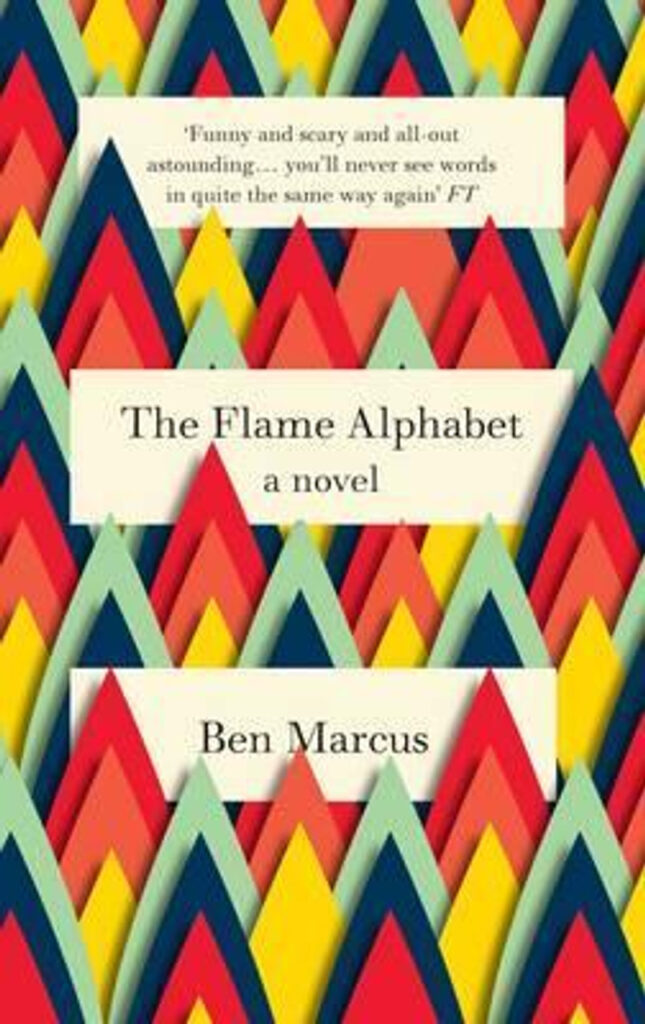
I had missed The Flame Alphabet back when it debuted back in 2012. I was already familiar with author Ben Marcus via his 1995 postmodern cult short-story-collection/surrealist-dictionary/technical-manual-from-another-dimension The Age of Wire and String; I’d also checked out his 2002 novel Notable American Women, an extended narrative that seemed to take place in the same multiverse as Age of Wire and String. Though I could respect his radical innovation and chutzpah (Marcus is Jewish, natch), I ultimately found his first two books to be something that was more fun to talk about than to actually read.
Two things changed to finally get me interested in The Flame Alphabet: 1) I became a new father myself—complete with constant midnight feedings and screamings and crying and chronic sleep deprivation and so forth—and suddenly a book about how the speech of children has become toxic to adults didn’t seem so far fetched, in fact started to feel like a pretty spot-on metaphor; and 2) we all lived through the COVID-19 pandemic, and suddenly a novel about mass lockdowns during a deadly, global airborne event didn’t seem so far-fetched either.
The novel is centered around the first-person narration of one such young father living through this mysterious pandemic; he recalls the stinging barbs that his growing daughter would launch at him and her mother as she hit her early teens, even before her language became literally toxic. The symbolism becomes almost too on-the-nose at that point.
But that’s only the first third of the novel. The second third follows this unnamed narrator as he becomes separated from both his daughter and his sickened wife as the toxicity of children’s speech leads to mass-quarantines. The crisis escalates when it becomes apparent that all language—spoken, written, recorded, whatever—is toxic to everyone over the age of 13 or 14. The narrator gets roped into a research facility by unscrupulous state actors, where he’s assigned to find a new script for communication that will not literally kill adults. Adding to the sinister feel is that the facility’s director LeBov (the closest thing the novel has to a straight antagonist) has figured out how to siphon something out of children and convert it into a vaccine, called “Child’s Play,” that allows adults to talk to each other temporarily without causing each other lethal pain. Much of the biting repartee between the narrator and LeBov in this second part comes in these moments of drug-induced protection.
Since the novel entire is written in words after the fact, you the reader naturally assume–or at least hope–that a more permanent cure must’ve eventually been found, or the catastrophe must’ve passed like many a plague before, but no: the third and final part reveals that the narrator escaped the facility and made his way back to his hometown, where he rescued his daughter after she aged out of immunity to the lethality of language herself, and lives with her in silence, in a hut hidden in the woods. Civilization has largely collapsed, and he has figured out how to make “Child’s Play” himself–gathered from the breath of frightened, wandering children that weren’t so lucky. It is in these brief moments of linguistic lucidity that he composes the text of this novel, looking forward to some distant, futuristic date when the human race will be able to read and speak again, and finally be able to understand this record.
That is, The Flame Alphabet is a sort of post-apocalyptic Book of Mormon, hidden up after a civilizational collapse to come forth at some distant future day. The fact that the narrator (like the author) is Jewish is perhaps also relevant here, since the Lehites were also refugees from Jerusalem, cast out into the wilderness.
But then there is also the sheer fact that this novel presents a world wherein language is literally impossible—which is in fact the case! This site has discussed just recently how language is the least relevant part of conversion. Heck, as an English instructor myself, I constantly grapple with the fact that study after study shows that most people, when presented with new evidence that contradicts their beliefs, do not then change their beliefs, but simply dismiss the new evidence as “fake news,” or biased, or just ignore it entirely. How am I supposed to teach students how to write an argumentative essay when I already know that most argumentative essays don’t work?!
But then again, I already learned that long ago on my mission: no one was ever baptized based upon my well-reasoned arguments, but based upon something else, the groanings beyond utterance, the peace which surpasses understanding, that ineffable thing that language tries to point towards but usually ends up distracting from instead, till you almost start to agree with the premise of The Flame Alphabet that maybe we’d be better off without language entirely—and that perhaps in the celestial realms, we will—
